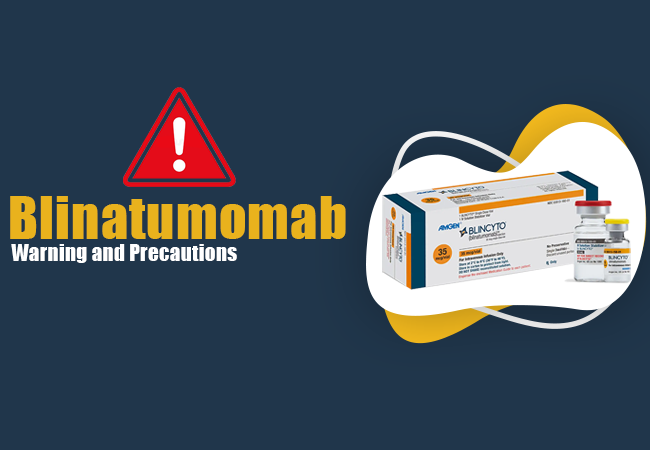The drug Blinatumomab is a bispecific CD19-directed CD3 T-cell engager that binds to CD19 and CD3. This medicine is sold under the brand name Blincyto. Healthcare professionals recommend using this medicine for treating patients with Philadelphia chromosome-negative relapsed or refractory B-cell precursor acute lymphoblastic leukemia. Blincyto is supplied in a single-dose vial for intravenous infusion in 35 mcg and 38.5 mcg.
Warnings and Precautions
- Cytokine Release Syndrome
There are reports of Cytokine Release Syndrome in patients treated with Blincyto. Reactions at the injection site have occurred with the Blincyto infusion. There may be clinically indistinguishable from manifestations of CRS (such as pyrexia, nausea, hypotension, increased alanine aminotransferase, asthenia, headache, increased aspartate aminotransferase, and increased total bilirubin).
One should closely monitor the patient for signs or symptoms of these events. Management of these events might require either temporary interruption or discontinuation of Blincyto 38.5 mcg.
- Neurological Toxicities
There are reports of Neurological toxicities in patients receiving Blincyto injections. The common symptoms of Neurological toxicities are headaches and tremors. The rare but fatal symptoms are encephalopathy, convulsions, speech disorders, disturbances in consciousness, confusion and disorientation, and coordination and balance disorders.
Healthcare professionals have limited experience with the medicine Blinatumomab in patients with active ALL in the central nervous system (CNS) or a history of neurologic events. Patients with a history or presence of clinically relevant CNS pathology were excluded from clinical studies.
One should monitor patients for signs and symptoms of neurological toxicities and interrupt or discontinue Blincyto as recommended.
- Infections
Healthcare professionals observed infections such as sepsis, pneumonia, bacteremia, opportunistic infections, and catheter-site infections in patients with Blincyto infusion. As appropriate, administer prophylactic antibiotics and perform surveillance testing during Blinatumomab treatment. One should monitor patients for signs and symptoms of infection and treat them appropriately.
- Tumor Lysis Syndrome
The patients receiving Blincyto are observed with Tumor Lysis Syndrome. Adequate prophylactic measures, including pretreatment, nontoxic cytoreduction and on-treatment hydration, should prevent TLS during Blincyto treatment. One should monitor for signs or symptoms of TLS. Management of these events may require either temporary interruption or discontinuation of Blincyto.
- Neutropenia and Febrile Neutropenia
Patients treated with Blincyto have reported Neutropenia and febrile Neutropenia. One should monitor laboratory parameters (including, but not limited to, white blood cell count and absolute neutrophil count) during Blincyto infusion. Healthcare professionals should interrupt Blincyto if prolonged Neutropenia occurs.
- Preparation and Administration Errors
Preparation and administration errors have occurred with Blinatumomab treatment. One should follow instructions for preparation and administration strictly to minimize medication errors (such as underdose and overdose).
Availability of Blinatumomab in India
One can buy Blinatumomab 35 mcg in India at reasonable prices. This medicine is readily available from certified pharmaceutical suppliers in India. To know more about this medicine, contact us at 18008891064 or email us at info@indianpharmanetwork.in.
Reference: https://www.accessdata.fda.gov/drugsatfda_docs/label/2017/125557s008lbl.pdf






